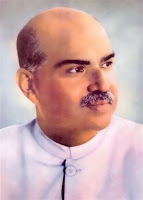Is Supreme Court of India above Constitutional Morality?
Supreme Court of India is
not above constitutional morality. Important social issues like same sex
married could be resolved by taking the inspiration from the constituent
assembly debates. Supreme Court of India must look into approach adopted during the making of the
constitution. Accommodation and consensus were the hallmark of
all the decisions that were taken during the making of the constitution. Whenever
there was lack of consensus on any issue, the approach adopted by the constituent assembly was not imposing the mamajority view . Right to
quality to women, right to vote to all the citizens of India above a particular age, provisions of prohibition
of untouchability were some of the issues
which were
not accepted by the people of India because they were adopted by the constituent assembly.But
because of the fact that there was a long history of social preparation ,participation and
acceptance. Thereby raising the consciousness for consenting these provisions in form
of fundamental rights. Close reading of history of independence of India will reveal that there were
social reforms which were going on side by side on these issues.Indeed because of those social
revolutions above mentioned fundamental rights were
accepted by all the citizens of the country at the commencement of the Constitution of India. Reading and
perusal of the constituent assembly
debates clearly indicates that
honorable members of the constituent assembly were not in haste in taking important decisions. They left to the future
generations some decisions because at
the time the consciousness of the masses was not ready for some important issues.
. Inclusion
of right to education in the fundamental rights was
rejected at the time of commencement of the constitution. Similarly
when the question of national language was raised it was
expected from Republic of India that
in succeeding
15 years the Hindi would become the
national language. Even the Uniform Civil Code was proposed to be included in the fundamental rights but was included under the Part IV, the
directive principles of the state policy. Interestingly, the debates
on the present article 21 the corresponding article was 14 in the draft
constitution clearly mentions that
reasonable
restriction on the basis of due process of law was much debated
and finally it was decided by the constituent assembly that right to life be subject to the procedure established by law. Hence law making in
the constitution of India is the domain of the legislature.
Sofar the debate in the corridors of political sciences has been that the legislature may , on account of the majority , act in such a manner that it will make a dent in the Constitution. But the attitude of the Supreme Court of India on the same sex marriage leads one to conclude logically and rationally that the constitution of India under the threat and under challenge by the Indian Judiciary itself.
If the Supreme Court of India crosses the
Lakshman Rekha then it will be
irreparable loss of the
legitimacy of the institution itself.
It will not auger well for the Republic of India. As a matter of
fact this will be suicidal for democracy of India.
Supreme Court of India has recently
started preaching about the constitutional morality. It is
surprised that today when this important topic is being discussed, there are
no whispers at the ground level. The reason being, the majority of
the people have full faith in the wisdom of the Supreme Court. But unfortunately
this silence is being perceived as the consent by the majority in the decision
taken by the Supreme Court. Hence it is required that the debate
in the media and at the ground level must take place without any delay. Mutual appreciation
and respect for the institutions by the institutions is the bed rock of
Constitutional morality. Having full vote of confidence in the competence and
wisdom of the institutions of governance
as per the scheme of the law of the land is one of the basic principle of
constitutional morality. Lack of
constitutional morality worldwide gives the liberty to the citizens of any
country to interpret that the fundamental rights are
the aim and object of the constitution. But the truth is fundamental
rights are the only means to achieve the aims and objects of the constitution
which are enshrined , in India ,in the Preamble of
the Constitution of India as well in the directive principles of the state
policy. Indeed, all the fundamental rights are subject to the reasonable
restrictions except Article 32. One of the
reasonable restriction is the public morality. Public morality cannot be
discarded or looked down upon as the view of the majority only.Public
morality has legitimacy in legal
jurisprudence since time immemorial .It is the public morality with gives
support to the institutions like the wedding and the family. Marriage between biological male and biological female is time tested successful , sustainable institution across
all the civilizations and the religions on this planet. Marriage
is for procreation and sex forms collateral in this institution. Procreation is
raison deter for the marriage hence marriage between biological male and
biological female is the natural and universally accepted norm in the history
of human race.Science , technology allows assisted reproductive technology and
social norms allows adoption but this only underlines and reinforces the basic requirement of the marriage is the
procreation only. Absence of ability of procreation forms one of the ground for divorce and as
well constituting the marriage voidable even between biological male and
biological female.
Supreme Court of India is likely
to set a wrong precedent by crossing the Lakshman Rekha. Constitutional
advice
to the learned members of the Apex Court is that if they feel for any activism in the form of making laws then
they should not use this pious and the sacrosanct institution . They can join the legislature. They can contest elections. They can go to the voters and explain their agenda so that they can
take the support as per procedure established by law.
Now a days three words like
secularism, pluralism and the diversity have become the fashionable words which are most misinterpreted and subject to the selective
definition and interpretation by some groups and individuals.
For the purpose of the secularism it is desirable that constituent assembly debates must be read by both the
petitioners and respondents as well by the members of the Apex Court of India. So that they
can reach to the informed conclusion. That this particular term was rejected by
constituent assembly .This word secularism is a loaded term . Its meaning and implementation
leading to mischief interpretation and
blunder was debated during the making of the constitution. It has
nothing to do with the Indian civilization. Illustrations of civilizations in
the constitution of India duly signed by the honorable members of the constituent
assembly is helpful in understanding and
comprehending the Indian view of secularism .Very smartly, in the name
of the secularism Special Marriage Act has been hand picked and the personal laws have been sidelined from this debate. This is
nothing but the back door entry into the personal laws of the all religions of this country. So far not a single religious
community or the denomination has accepted the same sex marriage.
As to the arguments on diversity, pluralism and egalitarianism , basic
principles of intelligible differentia are to be applied wisely and holistically
keeping the Indian society at centre . This ancient land has been known for the
integration, assimilation and synthesis. But it never compromised the core values as found in the four phases of
life, where married life is one of them. Solutions are to found in the forms of
institutions which provide peace, stability and sustainability to the ideals of
the society. Reforms have always been welcomed but without negotiating
the soul of the civilization.
It is very surprising that the Supreme Court has declined to issue notices to all the states in India. The apex court has not decided the request for making states party to the ongoing Cout proceedings. Marriage being subject of the Concurrent List.
Furthermore Supreme Court expects that only the states who want to put up their arguments , can file an application of impleadment for this particular subject which is one of the most important issue in the civilization history of India. Because issues like marriage and family have been the backbone of ancient Indian civilization. Objective resolution of the constituent assembly unanimously resolved to uphold the values of ancient civilized land of India.
Again the Supreme Court is
in hurry and does not want the discussion
or the opinion of the states. India has the federal form of governance. Why the
states are being deprived of
fair and impartial hearing. Same sex marriage is an important
issue and it must be dealt above politics. But it seems that the Supreme
Court of India is itself is indulging in surrogate politics. Is
Supreme Court of India complacent with the working or with the dealing
with the issues like this? Why does not Supreme Court of India deal with, first, the issue
of the jurisdiction.Whether Apex Court is competent
under the scheme of the constitution of India to deal with the subject matter
of same sex marriage. If it decides on merits and the basic principles of Indian jurisprudence ,it can go
in the detailed discussion. Is it not wasting the time and the
energy of the tax payers hard earned money? When millions
of the cases are pending, is it not the encroachment on the fundamental rights of speedy trial of the citizens of this country. It is very painful to see that the
Supreme Court of India can have this luxury of mental gymnasium in the form of the detailed hearing
without deciding the question of jurisdiction. On the issue
of jurisdiction how could there be a middle path or the middle strategy? Either it could be something which could be decided by the
Judiciary or something which is the perogative of legislature only. Is separation
of power not the part of basic structure doctrine of constitution of India ?Judicial
review could be invoked if the laws passed by legislation is beyond the scheme
of the constitution. What is the legitimate remedy for the citizens of this
country when the powers of judicial review are exercised in violation of the
constitution of India. But judiciary is not subject to will of the voters like legislation. Solution is with the
judiciary only.Consequently ,institution of judiciary is expected to set the
examples for other institutions on the matters of self restrain , discipline and constitutional morality.
Hence
avoiding the decision on preliminary objection of jurisdiction on one hand and haste in deciding
the case on other hand is the seal of breach of basic principles of universally acknowledged,
accepted and adopted legal jurisprudence by the Apex Court of India.




Very appropriate 👌
ReplyDeleteJudges own view can not be the view of the whole society.Judicial review has legitimate limits ,if any institution crosses the limit it will cause havoc in the society.
ReplyDelete